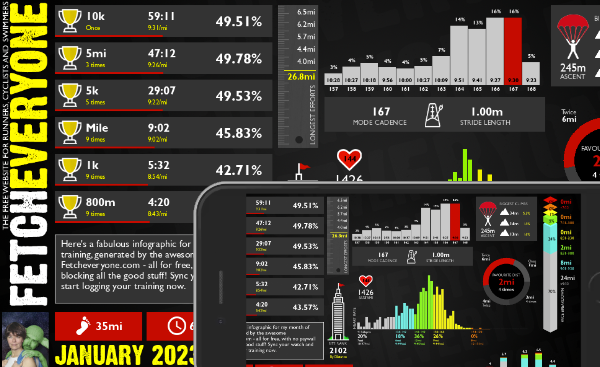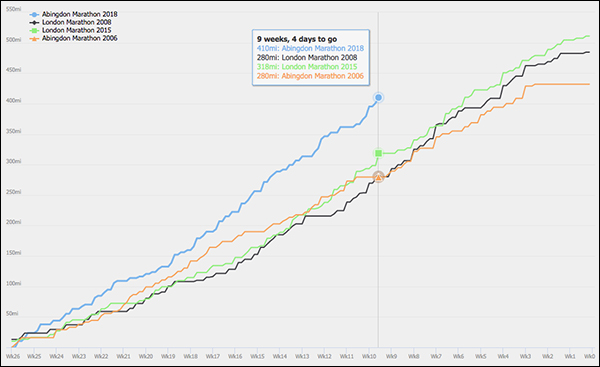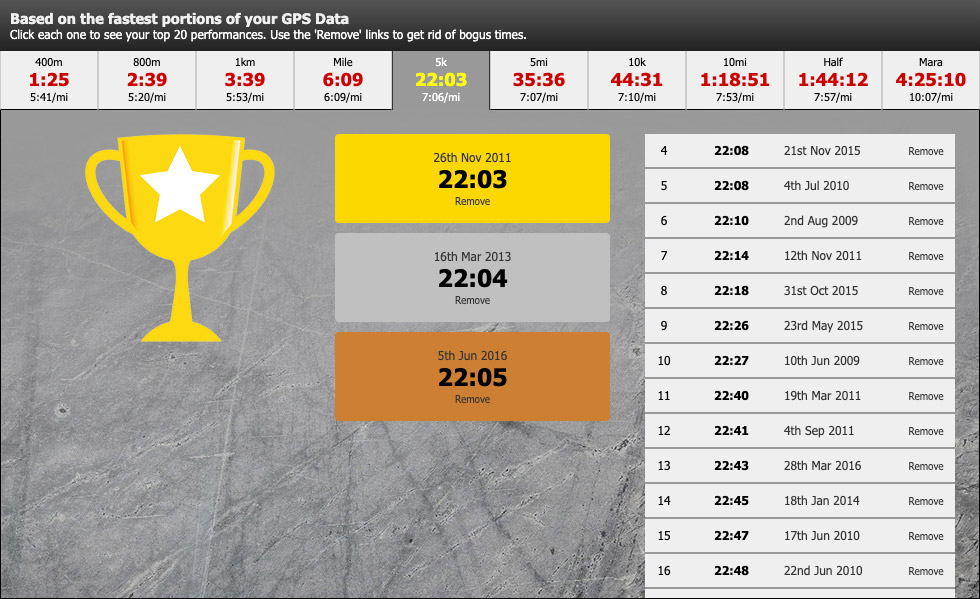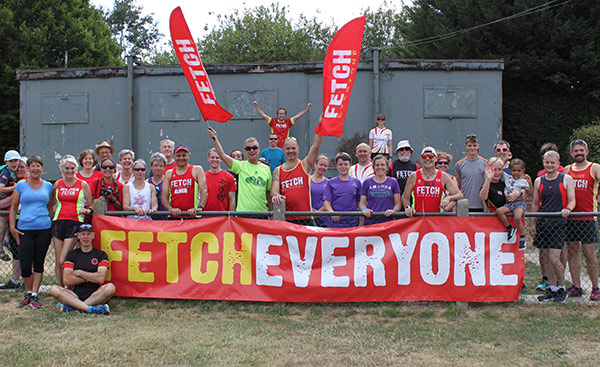Your Training Toolbox
Hit it as hard as you can, son.

When I was five, I asked my dad if I could help him demolish a wall. He gave me a claw hammer which I swung with enthusiasm, and it bounced back and smacked me right between the eyes. We’ve all had that childhood moment, where we’ve wandered into the shed and started playing merrily with something that could easily knock you out. And if you’re just starting out as a runner you need to show your tools the same respect.
Unfortunately, 'not running before you can walk' is an awkward analogy in this case – but as an apprentice runner you need to be comfortable with running on a regular basis before attempting anything more detailed. It doesn’t matter how fast you are, your first job is to make running a habit. Once you’re thoroughly addicted to running a few times a week, you can start filling your toolbox with different types of run that will help you improve your performance. Let's tool up!
Long Runs
Put simply, your long run trains your body to cope with running for as long as you need it to, whether it’s your first 5k or a marathon. They give you the opportunity to test out fuelling strategies and also give you time to tackle your mental demons before you meet them head first on race day. The toughness you develop when running long can also help you cope with the intensity of the last half of a shorter, sharper race. But remember that this is distance training, not speed training – if you can’t talk, slow down a bit. Although it can sometimes help to introduce a few sharper miles towards the end of your runs to simulate race conditions, take your time on your long run and enjoy exploring areas you don’t reach during the rest of the week.
Rest Days
As soon as you start to push your body, rest days become important. In tool terms, it’s leaning on your shovel drinking a cup of tea, whilst you turn things over in your head. In physical terms, it’s called the adaptation phase. When you work a set of muscles hard, your body responds by growing extra capillaries in that area, to help supply them with oxygen, and to help remove waste products. So if you’re feeling guilty about sitting on the sofa watching Ghostbusters, don’t worry, because your body is busily tricking you out. Not only has running got you off that sofa, it's made you better at sitting on it.
Tempo Runs
When you run hard, your muscles produce lactic acid, which your body tries its best to clear away. Your lactic threshold is the point at which your body can’t tidy up fast enough, and your muscles are overcome and struggle to cope. A weekly run at this sort of pace will train your body to handle the lactic acid more efficiently, to combat the feeling of fatigue when you run at speed. Warm up for a mile or two, and then build up the intensity until you’re running at a speed where you find it difficult to talk. Three or four miles at this pace will do wonders, and a gentle jog home at the end will help you to recover.
Intervals
Like Tempo Runs, Intervals involve pushing your effort level – but instead of one continuous effort, they are broken down into smaller chunks of harder effort, interspersed with periods of recovery. As well as helping your speed endurance, they help to strengthen your leg muscles, sharpening up your ability to run at speed. The intricacies of choosing the right interval session is a whole box of spanners in itself – but whether it’s 20 x 200m, or 4 x 1 mile, choose a pace that will see you run the final effort as fast as the first one, and don’t forget to warm up and cool down.
Hill Work
You can tell which runners have done their hill training – they’re the ones that seem to speed up on the hills whilst the rest go backwards. Running uphill puts different strains on your legs – your Achilles and calves are under more pressure as your heels land below the level of your toes, and your hip flexors work harder to lift your legs to higher ground. Training on hills will also strengthen your legs to improve your speed on the flat. If you’re new to hills, maybe start by trying to incorporate a hillier route in your training every so often – but don’t attempt K2 – a few minute-long climbs will help. Don’t forget to include downhill running too – it’s tempting to reach the top of a hill and then use the other side to recover, but it’s the one time when the gradient is in your favour, so practice making the most of it, and recover on the flat.
Recovery Runs
Just as interval training helps your body to cope with the rigours of running at pace, recovery runs help your body to cope with running whilst fatigued from the previous day. They come into play when you want to run more than three times a week, when you can no longer afford the luxury of taking a day off after each session. Drop the intensity, wear your least sexy kit, take the dog, use it as a chance to help your Uncle Frank train for his first 5k. Have fun – it’s about getting in a few miles to help your legs, rather than forcing anything.
If you’ve ever changed a plug with a dinner knife, or rewired a nuclear submarine armed only with a pair of tweezers, you’ll know that the tools that help you reach your goals are many and varied. This isn’t an exhaustive list by any means, but it’ll get you started.


Monthly Summary
A brand new shareable infographic showing a colourful breakdown of your training month.

Marathon Prediction
We delve deeper to give you greater insights when working out your goal marathon time.

Pre-race Training Analysis
See your accumulated mileage in the weeks leading up to any event in your portfolio, and compare it to your other performances

Your 365 Day Totals
Peaks and troughs in training aren't easy to find. Unless you use this graph. Find out what your peak training volume really is

Benchmarks
See the fastest portions from all your training runs. Filter by time to give you recent bests to aim at. Every distance from 400m to marathon.

Fetch Everyone Running Club
Join our UKA-affiliated club for event discounts, London Marathon ballot places, the chance to get funded for coaching qualifications, and a warm feeling inside.


Leave a comment...
-
Sorry I didn't get past the first 2 sentences without laughing. I will come back later when I have matured a little.

Ted
-
Very good article...and shared on FB now.:)
Garfield
-
Been there done that - only I used nail sissors for the sub
 Have shared.
Have shared.
Schnecke
-
or cut through a live wire with a bread knife... not that i would do that...
D2
-
Put it on FB nice article.
HermanBloom
-
Sprayed tea at lines 2-3 excellent article
Jon_T
-
Will share once I get home

Ultra Sparkly Bridget (USB)
-
shared

jog-on
-
Sharing with my Facebook cronies.
susietwoshoes
-
nice one

RFJ
-
Sharing on Twitter and FB for you.
SherryB
-
Recommending this to those new to running and new to the use of claw-hammers.
Sweaty Frank
-
shared...job done. tick
boulders
-
Nice simple explanations just what I need

sheri3004
-
Laughed and shared

Flip Flop
-
You do write brrilliantly Fetch. Ask Big Mick how many thou you'd get for that kind of wordsmithing for one of the big papers. And useful and accurate to boot. :-)G
HappyG(rrr)
-
My real metal man's toolbox has a couple of old rusty spanners and a hammer that loses the head every time you swing it. Hopefully my running toolkit doesn't follow suit! Great article Fetch.
Mushroom
-
Good read - posted on FB & twitter - clear advice on why various types of running are good for you (rather than mystifying as is sometimes the case!!)
Autumnleaves
-
great advice on why the various types of training help make you a better running over all. Totally agree with AL thank you. And I'll avoid the use of claw hammers in future that sounds painful.
geordiegirl
-
Great 'Back to Basics' article.
TeeBee
-
Good read - thank you
BaronessBL
-
Love it! A bit of everything in there - a good informative read and smiles to boot!
josieT
-
Great article. Easy to read and understand

Magbag
-
Very useful tips mr fetch and great read

Toks
-
great readthanks
Should Av Run Quicker
-
Great read as usual.
Dan1006
-
Thanks x
oldbiddy
-
Love this makes perfect sense to a newbie like me. Fanx
sarabop
-
Shared

jasond
-
I hate tempo runs. Just the though has given me a cold shiver. Although I am near the door at Starbucks.
Hackett
To comment, you need to sign in or sign up!shared on fb